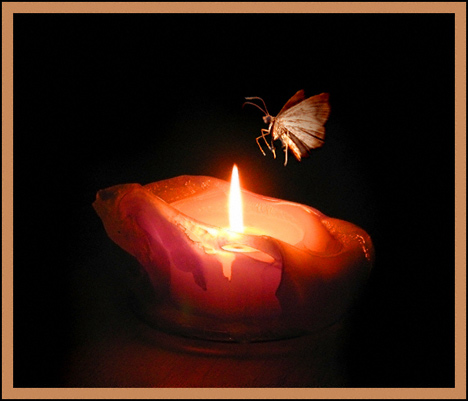Haiya!
I'll be talking about how light pollution affects one of the most important pollinators, moths! They may not seem like it, but they play a large role in the ecosystem as pollinators. Most moths are nocturnal pollinators, that is to say, they actively pollinate flowers at night. Some moths are specialised feeders, so they help us to deduce what kind of plants might be around the surrounding.
However, these moths are affected by something that most of us are not aware of: lights. While there are no concrete evidence as to why, and entomologists can only come up with theories, moths are definitely attracted to artificial lights. You see, when moths evolved into what they are over many many years, they were accustomed to lights coming from the sun during the day, moonlight and starlight (essentially reflected sunlight). Moths navigate by a process called 'transverse orientation', where they fly at a constant angle to a distant light source. So imagine now that this moth was innocently flying at night and comes across a very bright street lamp. It will be confused by this bright light and fly towards the source. By the way, moths aren't the only animals affected by artificial lights. Thousands of birds and bats are often killed as they knock into brightly-lit buildings and street lights.
Light sources that may disorientate them include street lamps, car headlights, LED signboards, porch lights... Basically all man-made artificial lights. Of course, it is impossible for us to switch off everything in order to save them. Artificial lights play a large role in our lives, it extends productive hours for us diurnal creatures and keeps our roads safe at night. However, we can each take little steps to save these little flyers.
As I know that Singaporeans are now aware of the impacts of their actions on water, air and soil, but they are not familiar with light pollution. I'll list a few things everyone can do!
1. Use curtains or blinds if you are going to work late into the night.
2. Switch off lights in rooms / porch / balcony if not in use! You can play a part in keeping moths on their track, as well as cut on your electricity bills.
3. Use light bulbs with lower wavelength. These are bug-friendly and less harmful to our health.
I'll be talking about how light pollution affects one of the most important pollinators, moths! They may not seem like it, but they play a large role in the ecosystem as pollinators. Most moths are nocturnal pollinators, that is to say, they actively pollinate flowers at night. Some moths are specialised feeders, so they help us to deduce what kind of plants might be around the surrounding.
| http://www.sciencepartners.info/wp-content/uploads/2012/08/speciality.jpg |
 |
| Don't blame moths when they kamikaze into your lights next time! https://unfoldingpaper.files.wordpress.com/2011/02/flame1.jpg |
As I know that Singaporeans are now aware of the impacts of their actions on water, air and soil, but they are not familiar with light pollution. I'll list a few things everyone can do!
1. Use curtains or blinds if you are going to work late into the night.
2. Switch off lights in rooms / porch / balcony if not in use! You can play a part in keeping moths on their track, as well as cut on your electricity bills.
3. Use light bulbs with lower wavelength. These are bug-friendly and less harmful to our health.
No comments:
Post a Comment